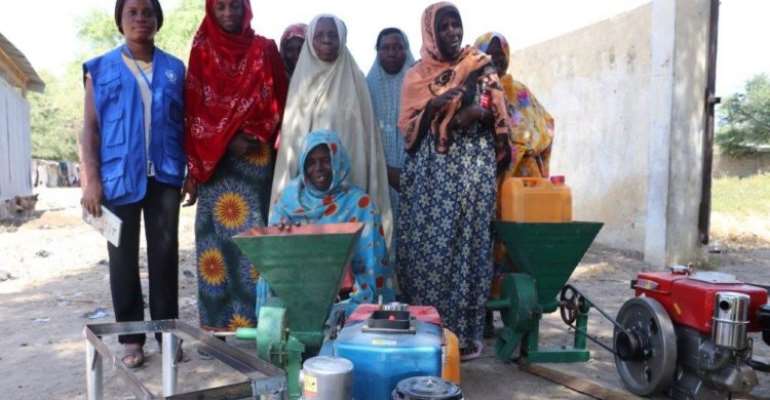WFP Dstributes Grains Milling Machines to 5,000 IDPs Households in Borno

The United Nations World Food Programme (WFP) has commenced distribution of 766 milling machines to 5,000 internally displaced persons (IDPs) households in Maiduguri to ease grains processing problems IDPs experience in processing their grains.
The distribution of the milling machines covers only 12 selected communities from 8 selected local government areas of Borno State which include Bama, Damboa, Dikwa, Gwoza, Jere, Mafa, Monguno and Konduga LGAs.
The milling machines are for processing grains such as sorghum, millet and others as well as for their own food needs to enable the households generate some income to maintain their milling machines which each has a toolbox.
Usage of the milling machines also save time and energy for the users, especially ,vulnerable women and girls who face a lot of difficulties in accessing milling services in the conflict-affected communities in the state.
Distribution of the machines was however focused on the most vulnerable groups in the state, women and girls, to reduce the problems they face in manual milling of their food grains.
The women and girls groups also received training on the maintenance and management of the milling machines. who are mostly responsible for food preparation in our homes.
It was also observed that most of the beneficiaries of food from WFP prefer to get milled sorghum or millet instead of the whole grains that take time to grind through traditional methods whole some sell part of their food to access milling services in the camps or host communities.
Mr. Myrta Kaulard, WFP Country Director in Nigeria said “We recognized that some families were selling part of the food assistance they received to pay for milling services, or spending so much time and energy to mill the grains using traditional methods. With these machines, they will now be able to save time and energy; conserve food, and also generate some money to maintain the machines,."
The items were distributed in collaboration with WFP and organizations , such as , Christian AID, Danish Refugees Council, CARE, International Medical Corps, INTERSOS, train the recipients on record keeping, financial management and maintenance of machines.
The milling machines initiative was made possible by the generous contributions to WFP’s food assistance activities in northeast Nigeria this year by Canada, European Commission (ECHO), Finland, Switzerland, the United Kingdom (DFID), the United States (USAID), and private donors.
The WFP Country Director said from January to October 2018, WFP provided food or cash assistance to an average of 1.1 million people every month affected by the conflict in northeast Nigeria.
However, WFP requires sustained funding to provide emergency food assistance, prevent malnutrition in young children and pregnant or breastfeeding women, support livelihoods and retain the flexibility to respond to further population displacement.
End
